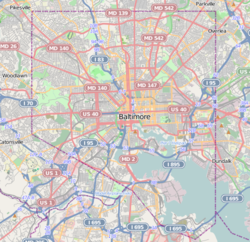Eastern High School (Baltimore)
|
Eastern High School
|
|

Eastern High School, August 2011
|
|
| Location | 1101 E 33rd St Baltimore, Maryland, U.S. |
|---|---|
| Coordinates | 39°19′40″N 76°36′8″W / 39.32778°N 76.60222°WCoordinates: 39°19′40″N 76°36′8″W / 39.32778°N 76.60222°W |
| Area | 17 acres (6.9 ha) |
| Built | 1936—1938 |
| Architect | James Edmunds Herbert Crisp |
| Architectural style | Tudor Revival & Jacobethan |
| NRHP Reference # | 00000870 |
| Added to NRHP | August 16, 2000 |
Eastern High School, established in 1829, is a historic all-female, public high school located in Baltimore City, Maryland, U.S. It was formerly part of Baltimore City Public Schools system. The old school building was renovated in the 1990s and is currently owned and used for offices by the Johns Hopkins Medical Institutions. It was listed on the National Register of Historic Places in 2000.
The last of several buildings in its 140-some year history was a three story, "H"-shaped structure, with a main lateral section and four projecting wings. It has a steel and concrete superstructure frame with red brick cladding and carved limestone trim in the Tudor Revival (or Jacobethan)style. One of two historically female public high schools in Baltimore City, the Eastern Female High School (along with "twin sister" Western High) were both established in 1844, a few months apart, as the first of their kind in the nation. E.H.S. was located in several buildings over the years including an earlier landmark Greek Revival styled structure on Aisquith Street off Orleans Street, in East Baltimore's Jonestown/Old Town neighborhood, designed by R. Snowden Andrews and later relocated to the southeast corner of Broadway and East North Avenue.
The fourth major building on the newly laid-out "33rd Street Boulevard" in the former Venable Park, laid out as a system of coordinated parks and boulevards along the city's western, northern and eastern sides of stream valleys in the former Baltimore County rural/suburban areas annexed in 1888 and more recently in 1918-1919 (part of a famous 1904 Report and later 1926 revision Plan) by landscape architectural firm of the famed Frederick Law Olmsted, who also designed New York's Central Park in 1858, and Baltimore's Druid Hill Park in the 1860s.
...
Wikipedia

